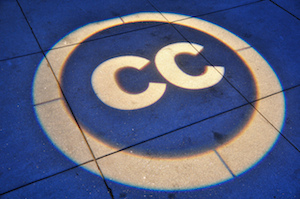
CC spotlight photo CC-BY Timothy Vollmer
After careful consideration and consultation with Creative Commons, we have decided to continue our regime of asking for explicit permission for use in OpenStreetMap from licensors of CC BY databases and data.
Although OpenStreetMap is largely created by volunteers that go out and map their neighbourhoods, we have often used external datasets to improve the map, either for cross-checking or more directly integrating the data. Many of these datasets are released on CC BY (Creative Commons Attribution) terms and that makes interoperability between these licences and our distribution licence, the ODbL 1.0, an important consideration for any use of such data in OSM.
Both the 2.0 and 3.0 versions of the CC BY (Creative Commons Attribution) licence have been popular with government and other sources for a long time. Due to differences between CC BY and the ODbL with respect to attribution, the LWG (OSMF Licence/Legal Working Group) has always required explicit permission from licensors to use such data in OpenStreetMap and attribute by adding an entry to our attribution pages on our central websites.
CC BY 4.0 is a revision of the original CC BY license with provisions for handling database rights and simpler language. You can see a summary of differences between the licenses here. The new version is becoming increasingly popular with potential data sources and we have received multiple requests to make a statement on compatibility of CC BY 4.0 licensed databases and data with the ODbL. For these reasons the LWG started, late last year, an effort to review the licence and to provide guidance to our contributors on the suitability of CC BY 4.0 material for OSM.
There had been some hope that CC BY 4.0 sources would be directly compatible with the ODbL. But while neither CC nor the OSMF has undertaken a complete compatibility analysis, we have identified at least one point of incompatibility and one possible challenge regarding attribution that lead us to our decision to continue to ask for explicit permission to use BY 4.0-licensed material in the OSM project. This is the best path forward.
The reasons for this decision are twofold: CC BY 4.0 allows some more flexibility in how a licensee can attribute the original source and many people have suggested that our indirect attribution mechanism already fulfills the requirements of BY 4.0. However the OSMF believes that licensors of BY 4.0 material may be surprised by this and that we should, for courtesy and good form reasons, continue to ask for explicit permission to attribute via our websites.
The 2nd reason is that the CC BY licences contain a strict prohibition on distributing so licensed material with DRM-enabled media/transport. The ODbL contains a similar restriction, but allows parallel distribution of “Derivative Databases” as a way to fulfill the obligation for unrestricted access. Distribution of ODbL “Produced Works” (for example maps) does not even require that.To avoid this incompatibility we will be requiring an explicit waiver of the prohibition on applying Technological Effective Measures (as defined in the license) found in Section 2a5B of CC BY 4.0.
To make obtaining the required permissions easier for everybody involved we have prepared a cover letter and a waiver form and a similar document for obtaining the necessary waivers for the 2.0 and 3.0 versions of CC BY. You can find them here. Please do not forget that imports need to follow our Import Guidelines and that having legal permission is just one of the required steps for a successful project using third party data.
I would like to thank Creative Commons, in particular Diane Peters for the support during this process and Kathleen Lu from Mapbox for drafting the cover letters and waiver forms.
Simon Poole – For the OSMF Licence Working Group
This post is also available in: German Japanese Ukrainian Greek

Thank you guys, this clarifies the issue.
It is a pity that we have to deal with this problems while constructing the libre knowledge world we all seem to want, but at least now we have some blessed waiver forms and cover letters to put to good use.
I think that for the waivers we should use the language the licensors are more comfortable with. Would a translated waiver still be considered valid by the LWG?
Thank you,
Santiago Crespo
> Would a translated waiver still be considered valid by the LWG?
Sure, if we have a reasonable way of verifying the contents. The text is not particularly complicated and I wouldn’t expect larger issues.
Simon
Is it intentional that the cover letter mentions “on our Contributors page” as the location for attributions, while the waiver mentions attribution “through https://www.openstreetmap.org/copyright“?
Yes that is an error fixing as I type.
Pingback: weeklyOSM 348 | weekly – semanario – hebdo – săptămânal – haftalık – 週刊 – týdeník – edisi